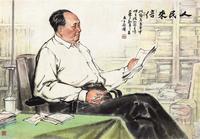Speaker: Professor Aminda Smith, Michigan
The fabricated reports from China’s Great Leap Forward, the rampant false accusations of the Anti-Rightist campaign, and the Party’s idealized propaganda in the Cultural Revolution are among the many factors that have led scholars and other observers to see the Chinese Communism of the Mao years as something of a sham, its rhetoric more fraudulent than authentic on balance. Yet, even as their own claims were not always truthful, discerning true from false was always at the heart of the Chinese Communist project. At the most prosaic level, officials needed reliable information to design policies. False reports, if published or propagated but then recognized as fake, could undermine the people’s trust in the party-state. On a much deeper level, as Ai Siqi, Mao Zedong’s most prolific interlocuter, explained, Mao Zedong Thought contained a highly developed “theory of truth,” within which the mass line served as a key method for producing and verifying knowledge about the world and how to change it. This talk investigates one of the core practices associated with “mass-line work,” the “handling of letters and visits from the people,” to explore the ways that ordinary people, low-level cadres, and top officials discerned and debated which things were true and how they might be verified. I argue that deep discourses of truth telling and fact finding intersected with equally significant tendencies toward falsification and fabrication to create particular visions of what it meant to be a member of the people in the People’s Republic of China.
Aminda Smith is an associate professor in the History Department at MSU and co-director of the PRC History Group. She specializes in the social and cultural history of Chinese Communism, with a particular interest in the grassroots histories of political ideas. She has researched and written on brainwashing and thought reform, global Maoism, and China’s petition system.

Letters from the People 人民来信 artist: Chen Jiaxun